|
24 Watling Street / St Margaret's Street / Castle Street
Canterbury
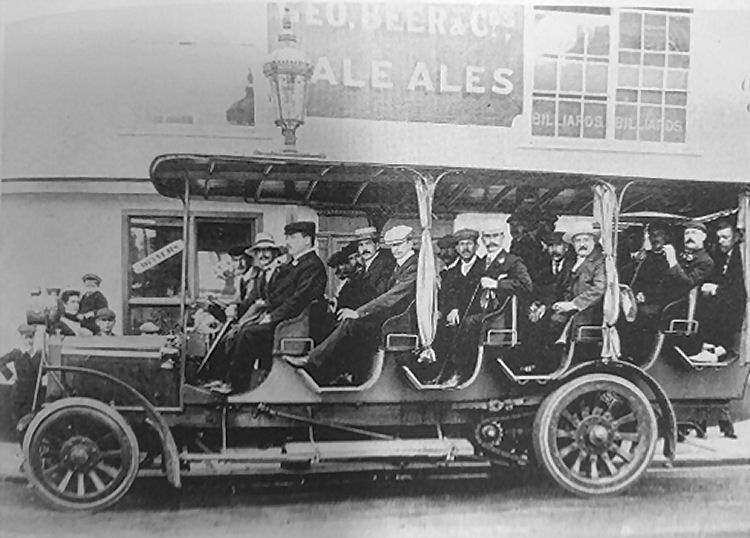
Above photo 1920, kindly sent by Rory Kehoe. |
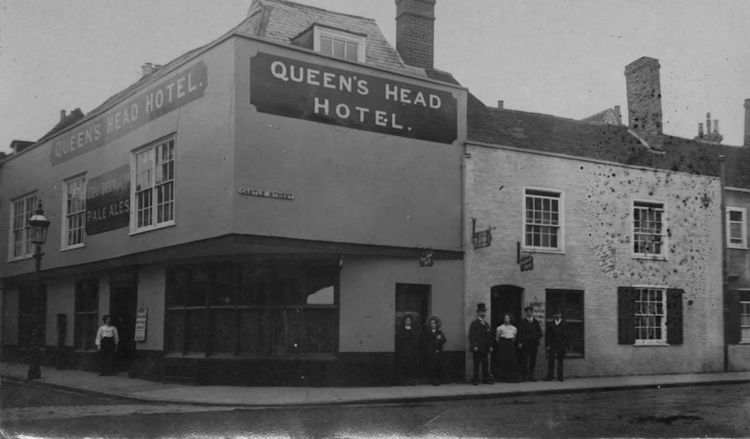
Above photo, date unknown. |
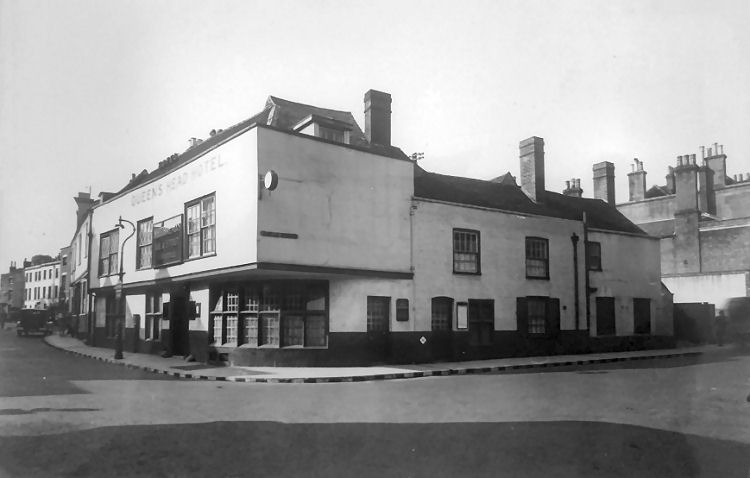
Above photo, circa 1938, kindly sent by Rory Kehoe. |
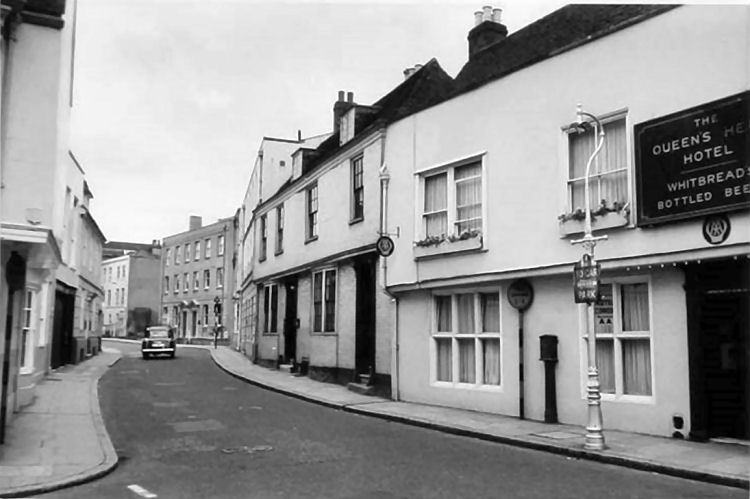
Above photo, 1961, kindly sent by Tim Timpson. |
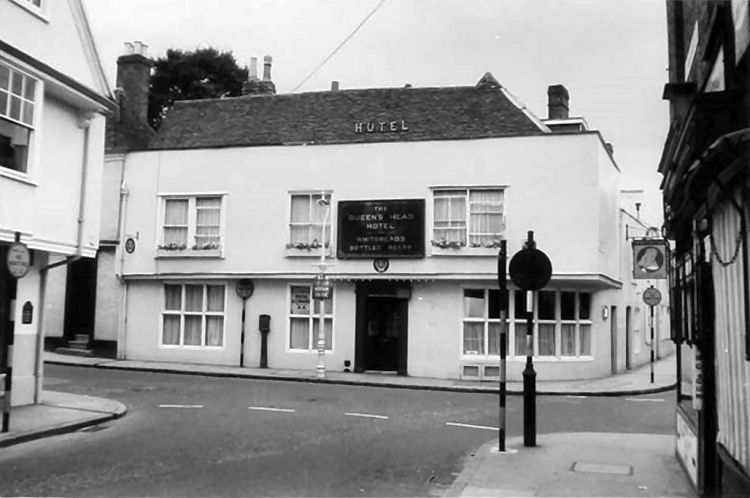
Above photo, 1961, kindly sent by Tim Timpson. |
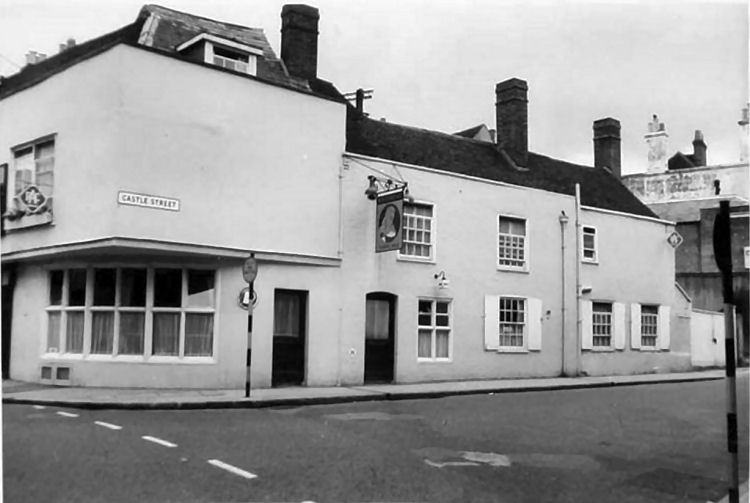
Above photo, 1961, kindly sent by Tim Timpson. |
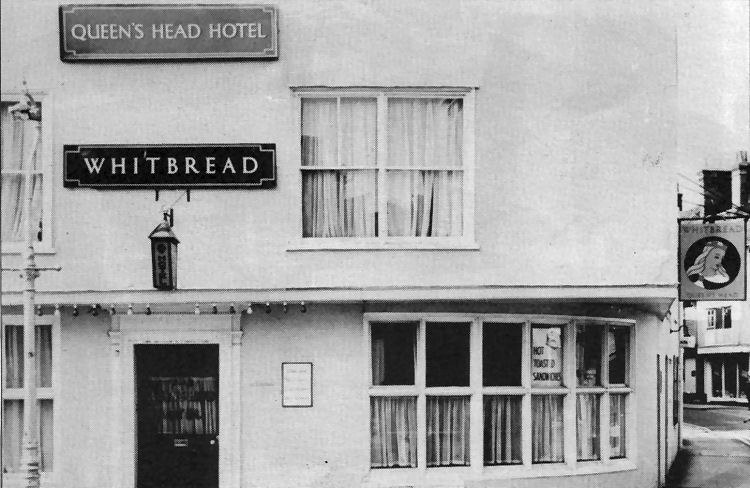
Above photograph taken by Edward Wilmot in 1965. |
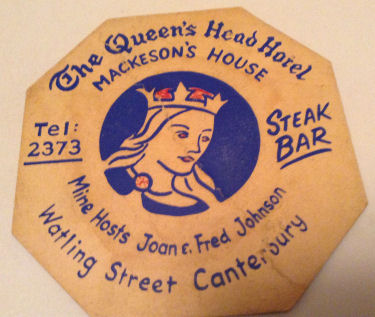 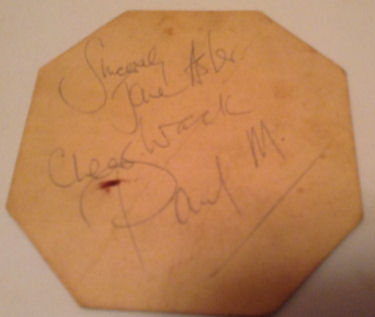
Above beermats kindly sent by C Johnson. |
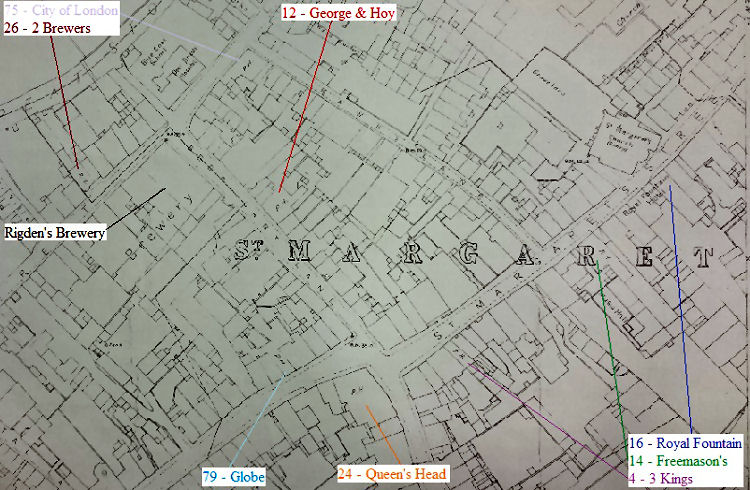
Above map 1874 identified by Rory Kehoe. |
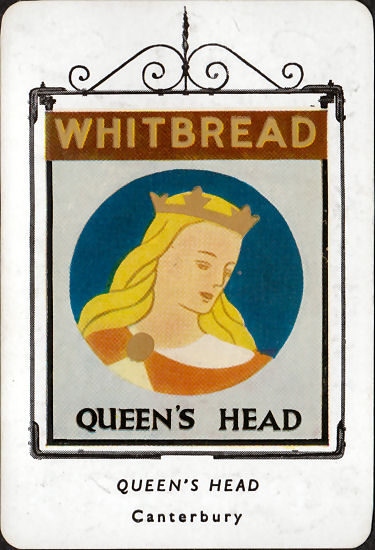 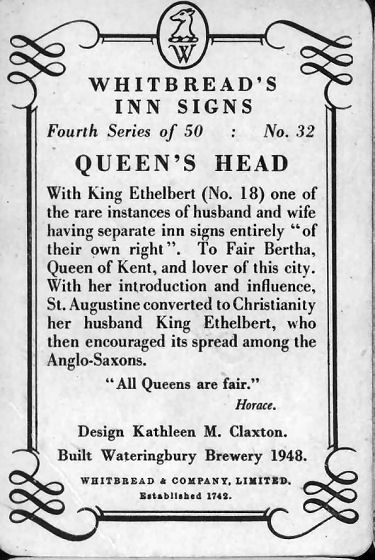
Above card issued March 1953. Sign series 4 number 32. |
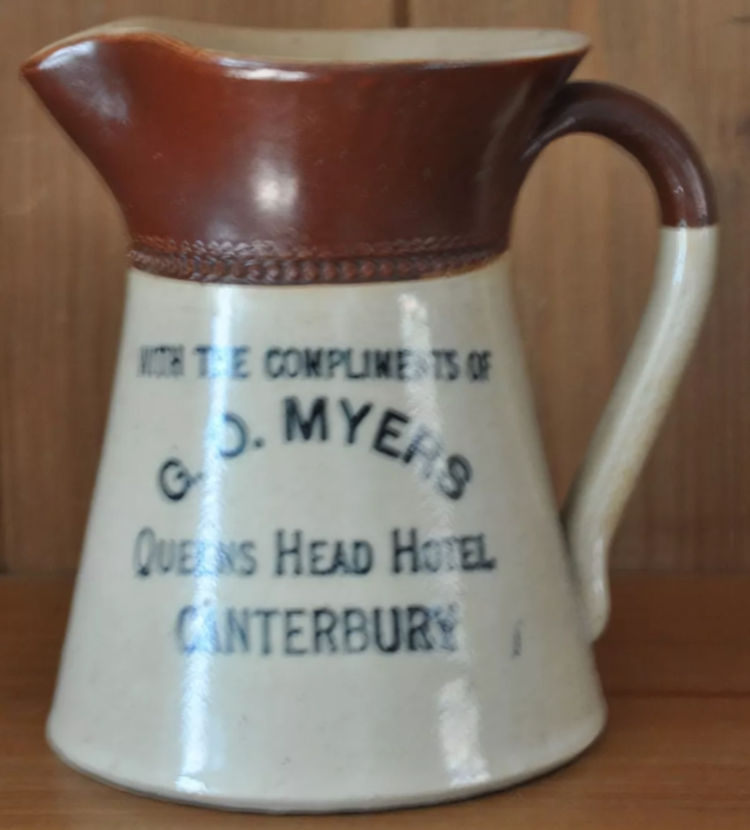
Above vessel circa 1909, kindly sent by Rory Kehoe. Presumably, this
Bristol glazed water jug was a complementary item, provided by the
licensee, when whisky, rum and perhaps gin was ordered by guests. It
only stands 120mm (4.75") high but containing enough water to dilute a
couple of stiff drinks. |
This is a 16th century building that originally held the name the "Three
Tuns," but it changed name to the "Queen's Head" at some time in the 18th
century and remained with that name till it reverted back to the "Three
Tuns" again, I believe some time in the 1970s, certainly before 1999.
The pub was seriously damaged during the air raids of 1942 by fire and
flying schrapnel.
By 1988 the pub had again reverted back to the name of the "Three Tuns."
|
From the Kentish Gazette, 12 October 1810.
QUEEN’S HEAD INN, CANTERBURY.
JOHN CLEMENTS, MOST respectfully returns his sincere thanks to his
friends and the public for the very liberal encouragement he has
experienced since he has kept the above Inn; and flatters himself,
that his conduct during the long period of 14 years, will insure
their future favours, which it Will ever be his study to merit, by
the greatest care and attention.
He further begs leave to inform them that he is become a partner
with Messrs. NICHOLSON, NEWMAN, and RICKMAN, in the Day and Night
COACHES to and from London, and in that line of business presumes to
solicit their support. Every attention shall be paid to the safety
and comfort of those who please to travel by the above Coaches,
which set out from Canterbury to London every morning at ten, and
every evening at seven o’clock.
Places and Parcels carefully booked at the "Fleur de Lis," "Queen's
Head," and "Flying Horse Inns," Canterbury.
|
|
Kentish Gazette, 28 August, 1821.
DESIRABLE FREEHOLD ESTATE.
TO BE SOLD BY AUCTION, By J. GRIST,
AT Mr. Jarvis's, "Queen's Head Inn," Canterbury, on WEDNESDAY, the
4th September, 1821, at three o'clock in the afternoon (unless
previously disposed of by Private Contract, of which due notice will
be given) a very Desirable Free hold Estate, comprising a Messuage,
Shop, Bakehouse, Barn, Hop Oast, Hop Stowages, convenient waggon,
cart and other lodges, and farm-yard, together with 31A. 2R. 38P. of
arable, pasture, and hop ground, situate lying in the parish of
Stelling, in the County of Kent, and now in the occupation of the
proprietors.
The house and buildings have lately been put into a most excellent
state of repair; the Shop is a very old established one, in wjhich
the general business of a Country Shop has been carried on for many
years; the Land is in a high state of cultivation; and possession
may be had at Michaelmas day next.
The Estate adjoins to, and has a Right of Common on Stelling Minnis,
which is very extensive.
For particular, and to treat for the same by Private Contract, apply
to Mr. Atwood, on the premises; or to Mr. Grist, Land Surveyor,
Canterbury, where a Map of the Estate may be seen.
|
|
Kentish Gazette, 27 November, 1821.
Yesterday, Mathew Jones was committed to Westgate gaol by the
Mayor of this city, charged with stealing a bridle, the property of
Mr. Daniel Jarvis, landlord of the "Queen's Head Inn."
|
|
Kentish Chronicle, 7 April 1829.
An inquest was held on Saturday last, before Mr. John Nutt, at the
"Queens Head Inn," in this city,
touching the death of John Fox, who was discovered that day,
suspended from an upright beam, on
the premises of his master, Mr. G. Neame.
It appeared that in the early part of the morning, the deceased was
engaged in his usual occupation;
and his master having occasion to enter the room in which he was
employed, observed him to be
greatly confused, and endeavour into secrete about his person a
small parcel. Mr. Neame interrogated
him; but his explanation instead of him, rendered his guilt but too
apparent; accordingly he was
discharged, and an understanding that is wages in arrear were to be
paid.
A few minutes after this affair, the deceased enquired, if he might
expect a character, to which he
received an answer that "he might for everything except honestly."
The deceased and said, perhaps he should not require one, and in
half an hour was found hanging
quite dead. It appeared by the testimony of Mr. E. Hohler, surgeon,
who cut deceased down, that he
must have groaned out is existence in the most terrible manner; the
rope was exceedingly short, and
his struggles were so severe, that the hook above his head, had
penetrated his skull a considerable
depth. The deposition of Mr. Neame shewed that the poor fellow had
before being detected in similar
practises. On this occasion he had acknowledged the robbery.
Deceased was a fine young man, in
23rd year of his age.
Verdict - Temporary Insanity.
|
|
Kent Herald, 23 June 1825.
James Campbell, a young man respectably dressed, who stated himself to be a
publican, at Brighton, was committed to the gaol of this city on Monday charged
with stealing two table-cloths, the property of Mr. Jarvis, landlord of the
"Queens Head Inn." We understand that this is not the only Inn, where the
prisoner is opposed to have committed depredations.
|
|
Kent Herald, 14 July 1825.
William Campbell was indicted for stealing two tablecloths, the property of Mr.
Jarvis, in St. Margaret's, in whose house (the "Queens Head") the prisoner slept
for one night.
The prisoner pleaded guilty, but being advised to the contrary by the Court, he
pleaded not guilty.
Evidence was adduced to prove his pledging the table cloth, when he again
persisted in pleading guilty, and was sentenced to 12 months imprisonment.
|
|
From the Kent Herald, 17 October 1833
Canterbury, Monday
On Monday, an inquisition was held before Mr. John Nutt, in the parish
of St. Mary Northgate, in this City, on the body of Walter Reynolds, a
youth aged 17 years, who destroyed himself by taking laudanum on
Saturday last - the insanity of the deceased was fully established by
the evidence and a verdict returned by the jury accordingly.
On the same day, another inquisition was held before the same coroner in
the parish of St. Margaret, in the city on the body of William Wilds, a
labourer, aged 28. It appeared that the deceased came to the Fair in
this City on Saturday last, and after drinking at several places, became
dreadfully intoxicated; he was seen lying in the streets surrounded by
his companions, when, by the desire of a respectable individual, he was
carried into a stable of the "Queens Head Inn," where every attention
was paid that the situation of a man in his state appeared to required.
On the Osler going to look to him afterwards, he found him quite dead.
Mr. Major, surging, who examined the body, was of opinion that is the
deceased died of apoplexy occasioned by excessive drinking.
Verdict died by excessive drinking.
Thus on the same day have two persons passed out of this world by
untimely ends, one by the means of poison which, it is to be regretted,
can be too easily obtained at almost every shop where drugs are vended;
and the other by that scourge of human life, ardent spirits.
|
|
From the Kentish Gazette, 12 June 1838.
TO LET. WITH IMMEDIATE POSSESSION.
THAT well-known old-established House the "QUEEN'S HEAD TAVERN," Wine
Vaults, Excise Office, and Stables, commanding an excellent business.
Apply to Mr. Duncan, on the Premises.
|
|
From the Kentish Gazette, 3 March 1840.
ON Saturday, the 15th of February, a DARK BROWN GREAT COAT,. In mistake,
was taken from the parlour of the "Queen's Head Inn," Canterbury, and a
very dark green coat was left in its place. Whoever is in possession of
the first-named coat, and will have the products immediately to forward
it to Mr. DUNCAN, at the "Queen's Head" aforesaid, the latter-names coat
shall be returned as may be directed by the owner.
March 2. 1840.
|
|
From the Kentish Gazette, 21 November 1843.
HOP DINNER.
THE Annual HOP DINNER at the "Queen’s Head Inn," Canterbury, will take
place on Tuesday, November 28th 1843.
Dinner on Table at Two o’clock.
|
|
Kentish Gazette, 2 April 1844.
R. DUNCAN BEGS to return his most sincere thanks to those friends who
have aided him by their support during the period of 10
years he has been in business at the "QUEEN'S HEAD INN," ST. MARGARET’S
STREET, CANTERBURY, and begs to assure them that
no exertion shall be wanting on his part to merit their continued
patronage.
R. D also begs to intimate that he he has HIRED FOR THE SEASON. THE
GRAND STAND ON BARHAM DOWNS, where every
accommodation during the Races will be afforded as heretofore.
"Queen's Head," St. Margaret's-street, Canterbury, April 1, 1844.
|
|
Kentish Gazette, 19 November 1844.
HOP DINNER.
THE ANNUAL HOP DINNER at the "Queen's Head Inn," CANTERBURY, will take
place on THURSDAY, NOVEMBER 28th, 1844.
Dinner on Table at Two o'clock.
|
|
From the Kentish Gazette, 2 December 1845.
HOP DINNER.
THE ANNUAL HOP DINNER at the "Queen's Head Inn," CANTERBURY, will take
place on TUESDAY, DECEMBER 3, 1845.
Dinner on Table at Three o'clock.
|
|
From the Kentish Gazette, 8 December 1846.
R. DUNCAN.
BEGS most respectfully to announce the Twelfth Anniversary of his annual
HOP BETTING DINNER, which will take place on THURSDAY, the 10th instant,
when the company of his friends will be esteemed.
"Queen's Head Inn," Canterbury,
Dec. 5th, 1846.
|
|
Kentish Gazette, 24 August 1847.
TO INNKEEPERS AND OTHERS.
TO BE LET, with possession at Michaelmas next, that old established
Commercial Inn, known as the "QUEEN’S HEAD," situated in ST. MARGARET’S
STREET, in the City of Canterbury.
The above comprises a good commodious Tavern, and the Excise Office,
together with spirit bar and stable yard adjoining; and the present
occupant can give satisfactory reasons as to the cause of his leaving.
For particulars apply on the premises.
|
|
Kentish Gazette, 6 February 1849.
QUEEN'S HEAD INN, CANTERBURY.
THIS most desirable free PUBLIC HOUSE, commanding an excellent situation
at the corner of Saint Margaret's, Watling, and Castle Streets,
WILL BE LET BY TENDER, on TUESDAY, the 6th day of March next, for the
Term of 21 Years, from the 6th April, 1849.
The House comprises an attic, six bedrooms, a commodious dining room, a
parlour, spirit shop, bar, tap room, and loft over it, Excise Office,
smoking room, kitchen, two collars, coal store, yard, large coach-house,
very convenient and ample stable room, and other suitable adjuncts.
Sealed Tenders must be delivered at the Office of Mr. William Sladden,
Solicitor, 24, Castle-street, (of whom the conditions of letting may be
obtained,) on or before Monday, the 5th day of March next; and the
Premises may be viewed upon application to Mr. Pierson, the present
occupier.
|
|
Kentish Gazette, 30 July 1850.
MARRIAGES. Bainbridge—Pierson.
July 29, at St. Andrew’s Church, Canterbury, by the Rev. — Smith, Mr.
Robert Bainbridge, of Hampton Court, Middlesex, to Margaret Elizabeth,
eldest daughter of Mr. W. Pierson, "Queen's Head Hotel," Canterbury.
|
|
Kentish Gazette, 23 March 1852.
DEATH.
Pierson:— March 31, Walter, infant son of Mr. W. Pierson, "Queen's Head
Hotel," Canterbury, aged six months.
|
|
From the Kentish Gazette, 26 May 1857.
Canterbury Incorporation.
At the weekly meeting last week an estimate of the outlay necessary
for putting the "Queen’s Head Inn" into substantial repair was
produced, and a tender for its execution submitted by Messrs. Hacker
and Crothall. The court decided that a special meeting for the
purpose of considering the question should be held, and that the
lessee, Mr. G. Beer, should be made acquainted with the terms which
the Court of Guardians would deem proper to offer, namely, that the
present lease should be cancelled and a new one granted at an
advanced rental of five per cent, on the outlay incurred. The
premises in question belong to charity trust property, bequeathed to
the poor of the city of Canterbury.
|
|
South Eastern Gazette, 24 April, 1860.
Charge of Assault against a Publican.
A Novel Case.
At the Thursday's sitting of the city justices, the following
magistrates ware present:— The Mayor of Fordwich (in the chair),
Ald. Sankey, Capt. Love, Wm. Plummer, and Edward Wotton, Esqrs.
Mr. John Elgar, jun., of High-street, said he had a charge of
assault to bring against Mr. Isaac Ratcliffe, landlord or the
"Queen’s Head Inn," on the afternoon of the previous Sunday.
The Chairman inquired if the matter could not be settled without
being brought before the justices?
Mr. Elgar said he had endeavoured to do so, but without success.
Mr. Elgar, who is a Member of the Society of Friends, then stated:—
About half-past two o’clock on Sunday afternoon last, I was going
down St. Margaret’s-street, in the direction of the Dane John, when
I saw two men before me. One of them was in a very sad state of
intoxication, but the other did not appear the worse for drink. When
they arrived opposite the house kept by the defendant, one of them
said to the other, "If you will not come in and drink with me, I
will never drink with you again." Knowing that the law forbade
innkeepers from serving a man in a state of intoxication, I followed
the two men into the house. I said "Neighbour Ratcliffe, thou must
not draw any more drink for that man, as he is in a state of
intoxication." I added that if he did, he would hear of it again. I
had no feeling of animosity against the innkeeper. The defendant
then charged me with wishing to take the bread out of his mouth. At
this time the men were sitting down in front of the bar, and the ale
or porter was standing on the bar. I did not see the men drink. The
defendant then said, "You walk out of my place." I said I should not
do so. His wife stepped forward at this time, and did all she could
to appease him. At last he came round from the other side of the
bar, and forcibly ejected me from the room. He might have told me
to leave his place again, before he did so. Seeing some boys
outside, I told them to go and fetch the police, my intention being
to give the drunken man into custody. I went into the house again
and stood by the bar door. The innkeeper again came and forcibly
ejected me into the street. I can't say what he said to me before
doing so — I think he requested me to leave his house. Defendant
then said he should go to the police station, and I understood he
was to be the complainant. During the interim, I saw that the men
went out at the back of the house.
By the Clerk:— In ejecting me, he did not strike me. There was no
more violence used than was necessary to put me out.
Defendant said:— I consider that Mr. Elgar took a great liberty in
coming into my house. He was interrupting me in my business, and I
felt that I was warranted in turning him out. One of the men was a
little the worse for liquor, but the other was perfectly sober. They
were both as quiet as the present company. When I had served them
with the beer, and turned Mr. Elgar out, they went quietly away.
The Bench then consulted together for a few moments, and the
Chairman (addressing the complainant) said:— The magistrates are of
opinion that there was no unnecessary violence used in this case. It
was hardly necessary for you to interfere, as the men were quiet,
although one of them was under the influence of drink, but there was
no disturbance. Therefore, we have determined to dismiss the case.
Mr. Elgar:— Is the assault to be justified?
The Bench declined to argue the point with the complainant.
The defendant was informed by the clerk, that if he wished, he might
have a certificate of the dismissal, which would be a bar to any
proceedings being instituted against him in any other court.
Mr. Elgar:— If I can’t get justice in one court, surely I can be
allowed to go elsewhere?
The Clerk:— But a man must not be harassed in two or more courts.
Defendant was then granted the certificate, the chairman observing
that the complainant had a very good motive in into the defendant’s
house.
Mr. Elgar:— I am not at all surprised that drunkenness increases in
our city. It will do so with such legislation as this.
|
|
From the Kentish Chronicle, 20 April, 1861.
George Tomkinson, labourer, was charged with stealing a quantity of beef
and suet, the property of James Field, butcher, Northgate. Mr. Field
stated that, on Saturday he weighed up 371bs. of beef and suet and sent
it to the “Queen’s Head Inn,” to be forwarded by a carrier to a customer
of his at Chilham. He afterwards ascertained that the beef had been
taken away. He identified the beef produced as a portion of that which
he weighed up.
It was proved by other witnesses that on Saturday afternoon the prisoner
took the beef to the “Steam Packet” public-house. North-lane, where he
had been lodging, and where the prisoner was apprehended on Saturday
night.
The prisoner, who pleaded not guilty, was committed for trial at the
next Quarter Sessions.
There was a second charge against the prisoner of stealing a bullock's
head and a quantity of meat, the property of James Gammon, from a cart
in the “Sun Inn” yard on the same day. This case was very similar to the
above, and the prisoner was also committed for trial upon the second
charge.
|
|
From the Dover Express and East Kent News, Friday, 18 August, 1889. Price 1d.
SMART CAPTURE OF A HOTEL THIEF AT DOVER
A check has been given to the career of an evidently daring and expert
hotel thief. He was arrested at Dover. A gentleman named Oakshot arrived
at the “Queen's Head Hotel,” Canterbury, on Thursday week, and arranged
to stay for the night. Mr. Oakshot left the house in the ordinary way on
Friday morning to transact business. Leaving his Gladstone bag and
contents in his bedroom. On his return at 3.30 he found that the bedroom
had been entered and that the bag was missing. He gave information to
the Police, and enquiries were made at the Railway stations. About four
o'clock it was ascertained that a man carrying a Gladstone bag,
answering the description of the one stolen, went to Mr. Anderson's,
Watling Street, and gained admission. During the temporary absence of
Mrs. Abderson he took a peg on the office door an overcoat belonging to
Mr. Anderson. This he put on, and was in the act of putting his own
overcoat on above it when Mrs. Anderson entered the office. As soon as
the man saw her he feigned drunkenness and said he wanted a cab. A
carriage was immediately procured. The cabman was ordered to drive to
Bekesbourne station. On the journey the driver discovered that his fare
was not drunk. On arriving at the station the cabman was paid 5s. and
dismissed. When Mr. Anderson got home he heard from his wife of the
man's behaviour. Thinking that he had been viewing the premises for some
illicit purpose and that he might renew his visit that night, Mr.
Anderson went to the L.C. and D.R. Station to make enquiries. He was
informed by the officials at the Station that the Police had been
enquiring about a black Gladstone bag stolen from the “Queen's head.”
Mr. Anderson observing the similarity between the bag carried by the
unwelcome visitor and the one described as stolen, communicated with the
Police. Mr. Anderson and the cabman were interviewed by Superintendent
Peacock. Subsequently the Superintendent and Inspector Farmery went to
the L.C. and D. R. Station, and by the kindness of the officials,
telegrams were sent to Bekesbourne and Dover. These enquiries resulted
in the discovery that a man with a bag (answering the description of the
missing one) left the train which reached the Priory station about 4.40.
It was 8 p.m. when the enquiries were completed. At 9.16, the next
available train, Superintendent Peacock despatched Inspector Farmery to
Dover to complete the investigations. On arrival at Dover the Inspector,
assisted by an officer of the Dover Police force made enquiries at
several leading hotels. At 11.30 p.m. “Connaught House,” was visited.
The manageress of the hotel informed the Inspector that a gentleman had
arrived that evening and taken rooms for a fortnight. The terms arranged
were £2 15s. a week. After hearing the description of the man the
Inspector asked to be shown to the bedroom occupied by him. The
manageress led the way and pointed out No. 14 on the third landing. The
Inspector knocked and simultaneously opened the door. The man was then
seen to be sitting in an easy chair with the stolen Gladstone bag before
him. He was examining the contents. Inspector Farmery speedily
introduced himself, and having had the contents of the bag re-packed,
secured the man. He had him lodged in the Dover Police station for the
night, and the following morning taken to Canterbury, when he was
brought before the Magistrates of that city and remanded.
|
Pigot's of 1828 lists George Jarvis twice in their Directory. Both times
at the "Queen's Head" but first addressed as Castle Street under the Inns
and Hotels, and secondly addressed as St. Margaret's Street under Taverns
and Public Houses.
LICENSEE LIST
CLEMENTS John 1796-1810+
JARVIS George 1821-28+
 
JONES Julia 1832+

DUNCAN Robert 1834-47+
  
PIERSON W Mr 1852+
RATCLIFF Isaac 1858-Jan/67+
  
OVENDEN Robert Jan/1867-82+ (age 39 in 1871 ) )
   
PILCHER George 1891-03+
  
MYRES G O 1909+
 CONE Joseph to Aug/1927
CONE Joseph to Aug/1927


SMALLWOOD John (Jack) & Maude 1936-63
JOHNSON Joan & Fred 1963-1970+
HOWES Geo & Kate early 1970s-mid 80s
https://pubwiki.co.uk/QueensHead.shtml
 From the Pigot's Directory 1824 From the Pigot's Directory 1824
 From the Pigot's Directory 1828-29 From the Pigot's Directory 1828-29
 From the Pigot's Directory 1832-33-34 From the Pigot's Directory 1832-33-34
 Stapleton's
Guide 1838 Stapleton's
Guide 1838
 From the Pigot's Directory 1840 From the Pigot's Directory 1840
 From Bagshaw Directory 1847 From Bagshaw Directory 1847
 From Melville's Directory 1858 From Melville's Directory 1858
 From the Post Office Directory 1862 From the Post Office Directory 1862
 From the Post Office Directory 1874 From the Post Office Directory 1874
 Census Census
 From the Post Office Directory 1882 From the Post Office Directory 1882
 From the Post Office Directory 1891 From the Post Office Directory 1891
 From the Post Office Directory 1903 From the Post Office Directory 1903
 From the Kelly's Directory 1903 From the Kelly's Directory 1903
 From the Dover Express From the Dover Express
 Whitstable Times
and Herne Bay Herald Whitstable Times
and Herne Bay Herald
|












